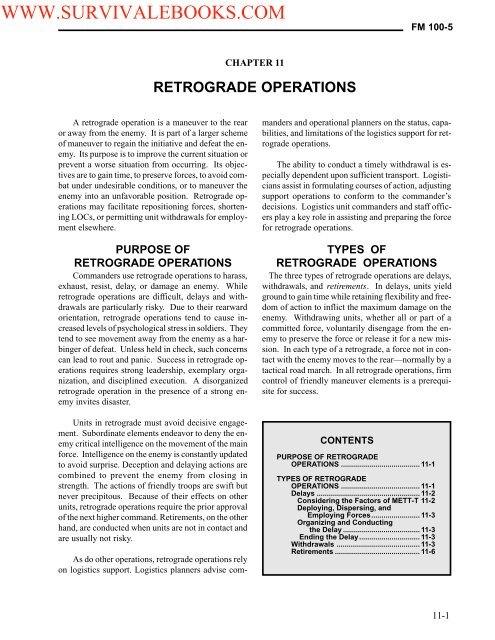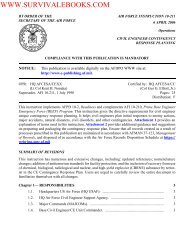FM 100-5 Operations - Survival Ebooks Military Manuals Survival ...
FM 100-5 Operations - Survival Ebooks Military Manuals Survival ...
FM 100-5 Operations - Survival Ebooks Military Manuals Survival ...
You also want an ePaper? Increase the reach of your titles
YUMPU automatically turns print PDFs into web optimized ePapers that Google loves.
WWW.SURVIVALEBOOKS.COM<strong>FM</strong> <strong>100</strong>-5CHAPTER 11RETROGRADE OPERATIONSA retrograde operation is a maneuver to the rearor away from the enemy. It is part of a larger schemeof maneuver to regain the initiative and defeat the enemy.Its purpose is to improve the current situation orprevent a worse situation from occurring. Its objectivesare to gain time, to preserve forces, to avoid combatunder undesirable conditions, or to maneuver theenemy into an unfavorable position. Retrograde operationsmay facilitate repositioning forces, shorteningLOCs, or permitting unit withdrawals for employmentelsewhere.PURPOSE OFRETROGRADE OPERATIONSCommanders use retrograde operations to harass,exhaust, resist, delay, or damage an enemy. Whileretrograde operations are difficult, delays and withdrawalsare particularly risky. Due to their rearwardorientation, retrograde operations tend to cause increasedlevels of psychological stress in soldiers. Theytend to see movement away from the enemy as a harbingerof defeat. Unless held in check, such concernscan lead to rout and panic. Success in retrograde operationsrequires strong leadership, exemplary organization,and disciplined execution. A disorganizedretrograde operation in the presence of a strong enemyinvites disaster.Units in retrograde must avoid decisive engagement.Subordinate elements endeavor to deny the enemycritical intelligence on the movement of the mainforce. Intelligence on the enemy is constantly updatedto avoid surprise. Deception and delaying actions arecombined to prevent the enemy from closing instrength. The actions of friendly troops are swift butnever precipitous. Because of their effects on otherunits, retrograde operations require the prior approvalof the next higher command. Retirements, on the otherhand, are conducted when units are not in contact andare usually not risky.As do other operations, retrograde operations relyon logistics support. Logistics planners advise commandersand operational planners on the status, capabilities,and limitations of the logistics support for retrogradeoperations.The ability to conduct a timely withdrawal is especiallydependent upon sufficient transport. Logisticiansassist in formulating courses of action, adjustingsupport operations to conform to the commander’sdecisions. Logistics unit commanders and staff officersplay a key role in assisting and preparing the forcefor retrograde operations.TYPES OFRETROGRADE OPERATIONSThe three types of retrograde operations are delays,withdrawals, and retirements. In delays, units yieldground to gain time while retaining flexibility and freedomof action to inflict the maximum damage on theenemy. Withdrawing units, whether all or part of acommitted force, voluntarily disengage from the enemyto preserve the force or release it for a new mission.In each type of a retrograde, a force not in contactwith the enemy moves to the rear—normally by atactical road march. In all retrograde operations, firmcontrol of friendly maneuver elements is a prerequisitefor success.CONTENTSPURPOSE OF RETROGRADEOPERATIONS ....................................... 11-1TYPES OF RETROGRADEOPERATIONS ....................................... 11-1Delays ................................................... 11-2Considering the Factors of METT-T 11-2Deploying, Dispersing, andEmploying Forces........................ 11-3Organizing and Conductingthe Delay ...................................... 11-3Ending the Delay.............................. 11-3Withdrawals ......................................... 11-3Retirements .......................................... 11-611-1

















